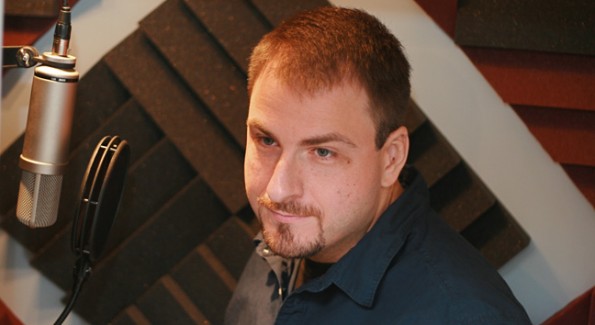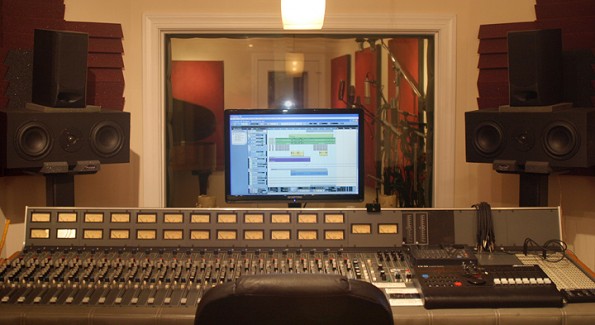A talented musician in his own right, Scott Harlan also sits behind the board at his very own DC-area recording studio, where he is living his own dream while also working to make other’s dreams come true.
The key to making great music is of course mostly in the hands of the musician themselves. It’s their music, it’s their songwriting, it’s their performing, it’s their overall talent that makes or breaks them.
But a key cog in the music-making machine, one that can be tremendously integral to a musician’s success, is the recording studio, where the rubber hits the road and dreams are either realized or dashed.
Scott Harlan knows a lot about both creating and recording music. And he’s keenly aware that the recording end of the business is a very intricate process, and it’s not automatic that magic will come out of a given session, whether he’s playing his own music, or shaping someone else’s.
“Not everything that you work on is just going to come together on it’s own. The times that it does are awesome, when everything falls right into place, when you’ve got great talent playing a great song and you’ve got great sound, and all of that is just there inherently, that’s the best. But that does not always happen.
There’s so many factors that contribute to it, you can only control it so much.”
Sage words from someone who knows what good music is all about. Today, Scott Harlan is a well-respected musician who plays bass with local favorites The Alexandria Kleztet and freelances with many others, and has played onstage everywhere from the Montreaux Jazz Festival to the Semanes De Musicales in Chile to the Kennedy Center. He has also turned out four CD’s of well-crafted original music, singing lead and playing a variety of instruments on each.
But his true calling seems to be his work as a producer and engineer at his very own recording studio, Golden Sound Studio in Kensington, Maryland. It’s here where Harlan’s talents as a musician can really take flight, a place where he takes the pieces of what other musicians bring to him and helps them mold it into something special. But the recording process can be a complicated and sometimes fragile one, and Harlan is very cognizant of the challenges that are present with every act that walks in his studio door.
“A lot of times, the challenge is getting them comfortable with letting go a little bit and letting someone else tweak what they’ve already done”, Harlan told me when we chatted in the control room of his studio last month. “Sometimes they come in with a song they’ve done and they’ve got a way of singing it that they’re very comfortable with and they like it, and I hear a vision for it that could take it to the next level, yet they don’t always necessarily feel that that’s the next level because it didn’t come from them. Also, you come into a studio and if it’s a well kept studio it’s pretty intimidating, people see all the nice gear and the nice rooms, it may be a totally different listening environment and it freaks them out. Then they have to wear headphones, and then they get in front of the mike and they hear every little detail, and that totally freaks people out too. So just getting that comfort level, getting over that hurdle of acclimation, that’s the one consistent challenge everybody has. For just about every artist I ever worked with, the second project we did together was always the best. Because the comfort level issue is gone, and you can concentrate on the music.”
Music has clearly been a lifelong passion for Harlan, who became involved in the craft when he was just past his single digits thanks to a few serendipitous relationships, and also thanks to, yes, his elevated math skills, which in a roundabout way helped propel him into the musical realm, all while his classmates were back doing their schoolwork.
“I’m pretty intelligent about math and science, but I also have this sort of inherent musical ability, which is strange because there’s no history of music in my family whatsoever. But in fourth grade, I’d already finished fifth grade level math, and when I was going into fifth grade, they’re like, ‘What are we going to do with him for math class?’ My elementary school was joined with a middle school, and the middle school of course had a strings program, but they were really short on players. So they decided in fifth grade they’d send me over to the middle school to play music, when everybody else was in math class. That’s where my bass playing began, it started with an upright bass because I’m a big guy, and then later, evolved into electric bass as well.”
A couple of years later, Harlan’s private music teacher, who also had a penchant for recording, exposed him to both the performing and recording sides of music. Thus, his musical development became two-fold; performing and recording were both part of the picture, and things began to happen fast. He not only began teaching private lessons when he was 16, but also worked in a local music store, which helped him hone his technical knowledge of everything from strings and instruments to audio and recording equipment. But it was getting turned down for a slot in a local band that may have been the golden moment where his recording career really took flight.
“There was a band I auditioned for and didn’t get into when I was 20. I was frustrated I didn’t get into the band, so I was like, ‘I’m gonna go make my own record!’ So I went into a recording studio in Fairfax called Walton Recording and recorded my first little project there. I got along great with the owner, and he’d been wanting to bring somebody on there, he was the only one doing work there at that time, and he said, ‘I’d love to have a second engineer working in here, are you interested?’ and I’m like ‘Yeah!’ Things really started there.
”
That experience may have been the single most important one for Harlan’s budding career as a producer/engineer, in that it gave him the chance to actually participate, get his hands dirty, in that side of the creative process. Now, he’s still playing music, but his principal involvement is behind the board at Golden Sound, helping fellow musicians find what they’re looking for, especially budding singer/songwriters, which seem to be his specialty.
So does Harlan himself have a “sound”, as many producers do, some kind of tangible feel that threads through the music they produce and becomes sought after?
“The thing I really like to do is find what’s really unique about an artist and try to exploit that, for the most part. But I always like to walk that line right between things sounding as good by modern standards as it can, but also as organic by traditional standards as it can, and that’s usually what I’m trying to walk towards, keeping people sort of in that middle area, so that it doesn’t sound so slick and amazing and polished that it’s unemotional, but at the same time it’s not so grungy and dirty that you’re going, ‘Wow, I wish that sounded better.’ There are some producers where you definitely can hear five artists they’ve worked with and hear a common thread. I don’t know that I always have that common thread, and part of that is just the diversity of what I work on. But as a producer, ultimately, I think I have a sound, sure.”
Whatever “sound” he helps to create in his studio, Harlan clearly knows what he’s doing. He’s not only a three-time Wammie nominee for “Recording Studio of the Year” but several artists he has produced or engineered for have also been nominated for or won Wammies and other music awards. Despite his obvious talents as a musician — he is often sought after by fellow musicians to collaborate – the chair behind the sound board is where Harlan appears to have found his rightful place, and luckily he has been able to keep afloat in these tough economic times doing what he loves. Living the dream, as they say.
“I’ve just always wanted to make a living making music. I would say that performing and playing is probably a bigger love for me than producing and recording for other people, I mean, everyone knows it’s more fun to be doing your own art instead of improving someone else’s. But every day that I get to keep doing this here in this studio is a pinnacle. I just feel really blessed to be able to do what I love for a living, that’s always been the dream.”
Visit Scott’s Golden Sound Studio here and his own website here.
Steve Houk is a freelance music writer who lives in Annandale VA with his beautiful blended family. He is also living a midlife rocker’s dream as lead singer of Northern Virginia classic/modern rock cover band Second Wind, check them out here, as well as Steve’s blog, midliferocker.com.






